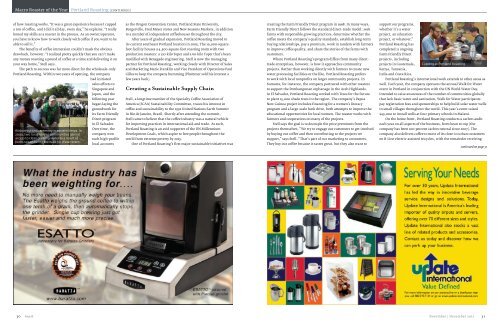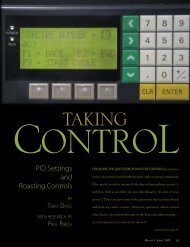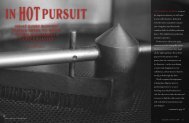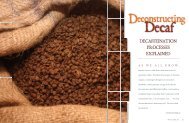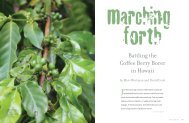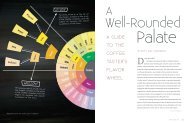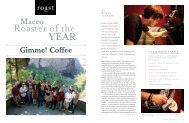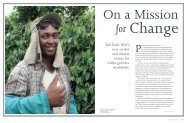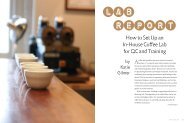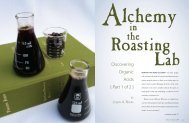PORTLAND ROASTING - Roast Magazine
PORTLAND ROASTING - Roast Magazine
PORTLAND ROASTING - Roast Magazine
Create successful ePaper yourself
Turn your PDF publications into a flip-book with our unique Google optimized e-Paper software.
Macro <strong>Roast</strong>er of the Year Portland <strong>Roast</strong>ing (continued)<br />
of how roasting works. “It was a great experience because I cupped<br />
a ton of coffee, and I did it all day, every day,” he explains. “I really<br />
honed my skills as a roaster in the process. As an owner/operator,<br />
you have to know how to work closely with coffee if you want to be<br />
able to sell it.”<br />
The benefits of coffee immersion couldn’t mask the obvious<br />
drawback, however. “I realized pretty quickly that you can’t make<br />
any money roasting a pound of coffee at a time and delivering it on<br />
your way home,” Stell says.<br />
The path to success was far more direct for the wholesale-only<br />
Portland <strong>Roast</strong>ing. Within two years of opening, the company<br />
had initiated<br />
sales efforts to<br />
Singapore and<br />
Japan, and the<br />
following year<br />
began laying the<br />
groundwork for<br />
its Farm Friendly<br />
Direct program<br />
in El Salvador.<br />
Over time, the<br />
Ribbon-cutting ceremony in eastern Kenya. In<br />
2009, two rural Kenyan communities gained company won<br />
access to clean drinking water as a result of such high-profile<br />
funds raised during the Walk for Water event.<br />
local accounts<br />
as the Oregon Convention Center, Portland State University,<br />
Burgerville, Fred Meyer stores and New Seasons Markets, in addition<br />
to a number of independent coffeehouses throughout the city.<br />
After years of gradual expansion, Portland <strong>Roast</strong>ing moved to<br />
its current southeast Portland location in 2005. The 19,000-squarefoot<br />
facility houses a 4,500-square-foot roasting room with two<br />
production roasters: a 120-kilo Toper and a 60-kilo Toper that’s been<br />
modified with Renegade engineering. Stell is now the managing<br />
partner for Portland <strong>Roast</strong>ing, working closely with Director of Sales<br />
and Marketing Marie Franklin and Vice President of Operations Paul<br />
Gilles to keep the company humming (Plummer sold his interest a<br />
few years back).<br />
Creating a Sustainable Supply Chain<br />
Stell, a longtime member of the Specialty Coffee Association of<br />
America (SCAA) Sustainability Committee, traces his interest in<br />
coffee and sustainability to the 1992 United Nations Earth Summit<br />
in Rio de Janeiro, Brazil. Shortly after attending the summit,<br />
Stell came to believe that the coffee industry was a natural vehicle<br />
for improving practices in international aid and trade. As such,<br />
Portland <strong>Roast</strong>ing is an avid supporter of the UN Millennium<br />
Development Goals, which aspire to free people throughout the<br />
world from extreme poverty by 2015.<br />
One of Portland <strong>Roast</strong>ing’s first major sustainable initiatives was<br />
creating the Farm Friendly Direct program in 1998. In many ways,<br />
Farm Friendly Direct follows the standard direct-trade model: seek<br />
farms with responsible growing practices, determine whether the<br />
coffee meets the company’s quality standards, establish long-term<br />
buying relationships, pay a premium, work in tandem with farmers<br />
to improve coffee quality, and share the stories of the farms with<br />
customers.<br />
Where Portland <strong>Roast</strong>ing’s program differs from many directtrade<br />
enterprises, however, is how it approaches community<br />
projects. Rather than working directly with farmers to create new<br />
water processing facilities or the like, Portland <strong>Roast</strong>ing prefers<br />
to work with local nonprofits on larger community projects. In<br />
Sumatra, for instance, the company partnered with other roasters<br />
to support the Pembangunan orphanage in the Aceh Highlands.<br />
In El Salvador, Portland <strong>Roast</strong>ing worked with Trees for the Future<br />
to plant 15,000 shade trees in the region. The company’s Papua<br />
New Guinea project includes financing for a women’s literacy<br />
program and a large-scale book drive, both attempts to improve the<br />
educational opportunities for local women. The roaster works with<br />
farmers and cooperatives on many of the projects.<br />
Stell says the goal is to decouple the price premiums from the<br />
projects themselves. “We try to engage our customers to get involved<br />
by buying our coffee and then contributing to the projects we<br />
support,” says Stell. “That’s part of our marketing to consumers.<br />
They buy our coffee because it tastes great, but they also want to<br />
support our programs,<br />
whether it’s a water<br />
project, an education<br />
project, or whatever.”<br />
Portland <strong>Roast</strong>ing has<br />
completed 11 ongoing<br />
Farm Friendly Direct<br />
projects, including<br />
projects in Guatemala, Cupping at Portland <strong>Roast</strong>ing.<br />
Kenya, Tanzania,<br />
India and Costa Rica.<br />
Portland <strong>Roast</strong>ing’s international work extends to other areas as<br />
well. Each year, the company sponsors the annual Walk for Water<br />
event in Portland in conjunction with the UN World Water Day.<br />
Intended to raise awareness of the number of communities globally<br />
that lack basic water and sanitation, Walk for Water participants<br />
pay registration fees and sponsorships to help build solar water wells<br />
in small villages throughout the world. This year’s event raised<br />
$49,000 to install wells at four primary schools in Malawi.<br />
On the home front, Portland <strong>Roast</strong>ing conducts a carbon audit<br />
each year on all aspects of the business, from bean to cup (the<br />
company has been 100-percent carbon neutral since 2007). The<br />
company also delivers coffee to most of its close-in urban customers<br />
on B-Line electric-assisted tricycles, with the remainder receiving<br />
continued on page 32<br />
30 roast November | December 2011 31


